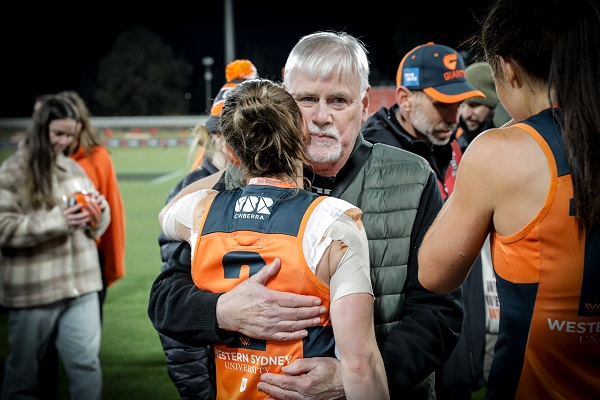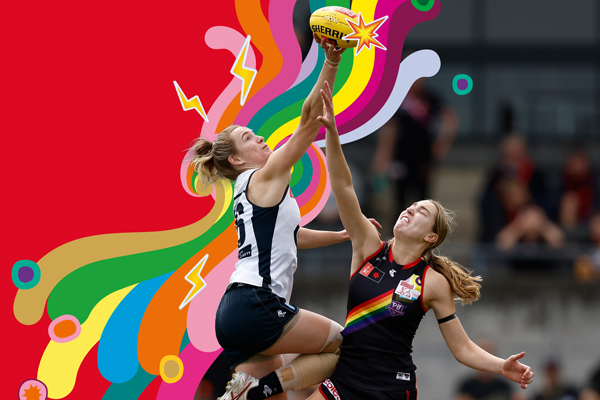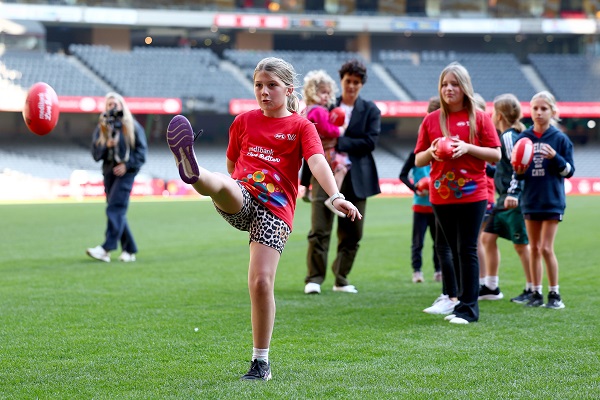When AFLW Greater Western Sydney Giants star Alicia Eva looks back on her junior footy years, she has fond memories of bonding with her family, particularly her dad.
Alicia was out on the field by age 5, as the first girl to go through the Auskick program at the East Malvern Junior Football Club.
She says her dad was an instrumental part of those early days.
“He put himself through a coaching course—he did his trainer’s certificate—just to help get the team off the ground and make sure there were staff there that were able to facilitate a program for young girls to play footy,” says Alicia.
“It’s been a really lovely shared experience for my father and I – this whole footy journey.”
Alicia says she’s grateful her family was supportive and encouraged her to make mistakes and learn from them, rather than focusing on excelling at the game.
Unfortunately, though, this isn’t the case for everyone. Research shows girls are still under-represented in organised sport compared to their male counterparts – and self-confidence can sometimes be an issue.
Debbie Lee, National Lead for Women and Girls Football at the AFL, says, while confidence can be a challenge for players of any gender, girls can sometimes struggle with self-belief for ingrained reasons.
“Girls often face societal pressures that can undermine their confidence in sports; boys, in contrast, are typically encouraged to be competitive and assertive from a young age,” she says.
“Girls may also experience heightened body image issues, which can affect their self-esteem and willingness to engage in sports. And, visibility of female athletes is generally lower.”
How to help your daughter build confidence
So, if you have a young person who is struggling with confidence in their game, how can you help?
1. Don’t worry about results
“Focus on effort, not just the outcome,” says Debbie.
“Praise your daughter's deficit improvements, rather than just focusing on winning.”
Alicia says the emphasis should ultimately be on having fun.
“The most important thing is that parents encourage kids giving things a go, and not get too hung up on the on the results, because that's how we keep kids engaged in sport,” she says.
“I'm really lucky I had the support of a great family – and it wasn't important to them that I was the best player on the ground, it was that I was enjoying myself.”
2. Be mindful of perfectionist language
Alicia suggests trying to let go of perfectionist tendencies or language.
“For me, it's been really important to understand that perfect doesn't actually exist, and if you're always striving to play the perfect game, you're actually not present in the here and now,” she says.
As well as going on to a storied playing career, Alicia took on a coaching role with the Giants men’s team from the age of 23.

“[As a coach,] I think language is really important … reinforce to any young athlete their strengths first and foremost, and then not so much highlighting what they've done wrong, but how they can get better.”
3. Validate feelings
Debbie says, if your young one opens up to you about how they’re going, make sure you stop and hear them.
“Listen and validate your daughter's feelings,” she says.
“Whether they're confident, whether they're not, whether they feel good about it, whether they feel left out – whatever it is, rather than trying to brush it off, actually validate.”
Alicia says, in her experience as a player, it’s important to acknowledge negative feelings when they arise, before moving forward.
“Personally, I think it's important that you actually allow yourself to feel those emotions and not shy away or pretend that they don't exist because, for me, it reinforces that I care about what I do,” she says.
“Equally, it's important not to sit too long in them.”
4. Go to women’s sport
Female representation in sport has come a long way over the last decade. Debbie says it’s vital that young players see their own gender visible at higher levels.
“Continue to expose your daughter to female athletes and role models,” she suggests.
“Actually take them to the netball or the basketball or to the AFLW, to see that women actually play sport, and show that they can play sport.”
5. Be a role model and get involved
Lastly, have a think about what you’re modelling to your kids when it comes to sport and physical activity.
“What are parents doing in their daily lives to have a healthy attitude towards physical activity? I think that's a big one to think about,” says Debbie.
Alicia says you may even like to get involved in a junior club – and encourages mums to think about coaching.
“Footy isn't just a place for dads and their daughters or dads and their sons; it's also a place for mums and their sons and mums and their daughters now,” she says.
“As we see more opportunities open up for women in football – and not just in a playing capacity, but also in coaching – we've got environments where more mums are getting involved.
“You don't have to know everything about football to get involved as a parent and it can be a really rewarding experience – it certainly has been for my dad and my family.”
As for Alicia’s dad now? “These days, he’s number 1 fan,” she says. “He’s at most Giants games.”

Medibank. Superfans of the AFLW.
Everybody deserves the chance to reach their full potential. That’s why we’ve joined forces with the AFLW as an Official Health Partner, to help tackle the health barriers facing women in sport.
For more information on supporting your child’s mental health visit headspace.org.au/partners-in-parenting or raisingchildren.net.au.
